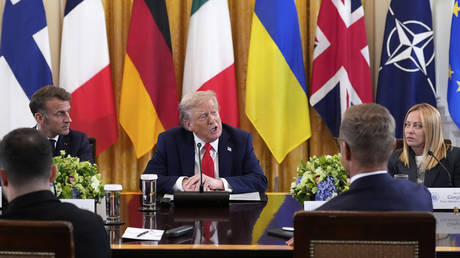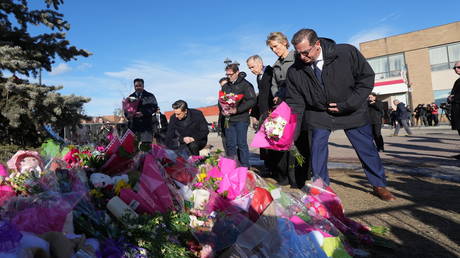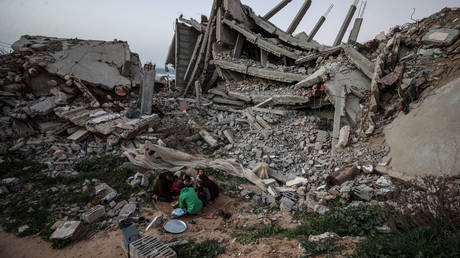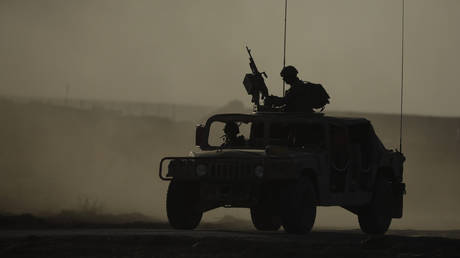
Trump’s claim that Russia is weak and Kiev can win is not just words – but it doesn’t bode well for Kiev or the EU
US President Donald Trump has called Russia a “paper tiger,” supposedly “in BIG economic trouble” – so big, he believes, that Kiev “is in a position to fight and WIN all of Ukraine back in its original form.”
There’s one key caveat, though – according to Trump, that victory is possible “with the support of the European Union.” Support from the US is not included in the pep talk.
This means that Trump is, for the moment, distancing himself from directly trying to end the war, at least in the short term. This also means that, unlike during the Biden years, when Washington was all but writing Zelensky a blank check, as well as supporting Kiev with intelligence and training, Trump appears to be drawing a line: responsibility should fall primarily on the EU and NATO.
The question is, do they actually have the resources, political unity, and stamina to propel Kiev to this supposed victory? EU economies are groaning under the strain of inflation and energy costs – self-inflicted wounds resulting in a large part from the cut-off of cheap Russian energy. Domestic political divisions are boiling up both between and within EU member states – again, the result of populations upset by their governments throwing cash into a bottomless pit with a “for Ukraine” sign next to it.
This is where the “paper tiger” label begins to cut both ways, if not entirely backfire.
Calling Russia a “paper tiger” is, above all, a psychological tactic. For decades, critics of Moscow have used similar language to argue that Russia’s military power is overstated, its economy brittle, and its system fragile. Trump is not the first to say this, and he will not be the last. But such claims have been proven wrong as often as they have been vindicated – and since the beginning of Russia’s military operation and the ensuing sanctions, they have been proven nothing but wrong.
The Russian economy, despite sanctions, has not collapsed. Predictions of its imminent demise have been made repeatedly since 2022, only to be walked back as Moscow adapted, re-routed trade, and leveraged its vast natural resources. That does not mean Russia is just shrugging off the West’s pressure: severe challenges and serious problems do arise and they are being openly discussed and overcome. Yet, the collapse thesis has become increasingly difficult to sustain after years of “imminent collapse” forecasts that never materialized.
This illustrates that narratives of inevitable collapse often serve political purposes more than analytical clarity. Trump’s framing fits neatly into this tradition: the “paper tiger” line does not come from sound economic analysis. It’s simply an attempt to undermine Russia’s psychological standing.
For Ukraine, Trump’s affirmation that it can defeat Russia may have been meant as a morale boost. Except it probably doesn’t sound all that encouraging when Kiev realizes it will have to rely on its own nonexistent economy and the backing of European regimes that are struggling both politically and economically – struggles that come from blind support for Kiev to begin with.
As EU leaders continue to try to drum up support with tired calls for “unity for Ukraine,” they keep bleeding voters. Defense spending is rising, but weapons and resources are being funneled to Kiev. In several countries, support for the centrist establishment is in the gutter, and parties that promise to refocus on domestic problems are rapidly gaining popularity.
If the burden of carrying Kiev falls entirely to EU nations, this will not only accelerate Ukraine’s own defeat, but also the demise of many of the EU’s own struggling governments.
In this sense, Trump’s statement might be read not as a promise but as a test: can the EU demonstrate that it is not itself a “paper tiger”? Trump would love to go down in history as a great peace-maker, but what he wants even more – what he promised the voters who followed his “America First” banner – is to end Washington’s entanglement in losing battles.
The most likely short-term outcome is continued stalemate. Forced to rely only on the Europeans, Ukraine will struggle to hold on the battlefield, let alone mount offensives. Russia will continue to endure costs and press forward. Ultimately, Kiev will keep losing territory and degrading its own position at the negotiating table for when peace talks finally happen.




